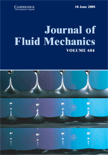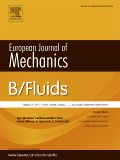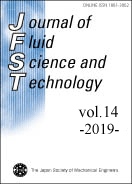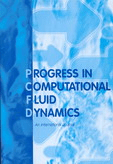
EXPERIMENTS IN FLUIDS
Scope & Guideline
Elevating knowledge in fluid mechanics with impactful research.
Introduction
Aims and Scopes
- Experimental Fluid Dynamics:
The journal predominantly emphasizes experimental approaches in fluid dynamics, including the analysis of turbulence, flow separation, and boundary layer phenomena. - Innovative Measurement Techniques:
It showcases advancements in measurement techniques such as Particle Image Velocimetry (PIV), Laser-Induced Fluorescence (LIF), and background-oriented schlieren methods to capture fluid flow characteristics. - Multiphase and Reactive Flows:
Research often explores multiphase flow dynamics and interactions between different phases, including gas-liquid and solid-liquid interactions, which are crucial for various industrial applications. - Aeroacoustics and Noise Control:
The journal addresses the relationship between fluid dynamics and acoustic phenomena, particularly in the context of reducing noise in aerodynamic applications. - Heat Transfer and Thermodynamics:
Papers frequently investigate heat transfer mechanisms in fluid flows, especially in high-enthalpy environments relevant to aerospace and combustion applications. - Fluid-Structure Interaction:
Research includes studies on how fluid flows interact with solid structures, impacting performance and stability across various engineering disciplines.
Trending and Emerging
- Data-Driven Approaches:
There is a significant rise in studies employing machine learning and data-driven methodologies to analyze fluid dynamics, optimize experimental setups, and enhance measurement accuracy. - Advanced Imaging Techniques:
Emerging techniques such as digital holography and time-resolved imaging methods are gaining traction, allowing for more precise visualization of complex flow structures and interactions. - High-Performance Computing Integration:
Research increasingly integrates high-performance computing simulations with experimental data to validate models and enhance the understanding of fluid dynamics under various conditions. - Environmental Fluid Dynamics:
A growing focus on environmental applications, including the study of pollutant dispersion and fluid dynamics in natural water bodies, reflects a broader interest in ecological impacts. - Microfluidics and Nanoscale Flows:
Research on microfluidics and the behavior of fluids at the nanoscale is emerging, driven by applications in biomedical engineering and materials science. - Multiscale and Multiphysics Problems:
There is an increasing trend towards addressing multiscale and multiphysics problems in fluid dynamics, where interactions across different scales and physical processes are studied together.
Declining or Waning
- Simplistic Flow Models:
Research focusing on overly simplistic models of fluid dynamics appears to be waning, as there is a noticeable shift towards more complex and realistic simulations that consider multiple interacting variables. - Traditional Flow Measurement Techniques:
Established techniques that lack the precision and versatility of modern methods, such as PIV and LIF, are being phased out in favor of more innovative approaches that provide higher accuracy and resolution. - Static Flow Analysis:
The journal has shown a decline in papers that focus solely on static or steady-state flow analyses, with a growing preference for dynamic and transient flow studies that reflect real-world conditions.
Similar Journals

Thermophysics and Aeromechanics
Bridging Disciplines for Tomorrow's Engineering ChallengesThermophysics and Aeromechanics, published by PLEIADES PUBLISHING INC, is an esteemed journal dedicated to advancing the fields of aerospace engineering, energy engineering, modeling and simulation, as well as nuclear and high energy physics. With an ISSN of 0869-8643 and E-ISSN 1531-8699, this journal serves as a vital platform for researchers and professionals working at the intersection of thermophysics and aeromechanics, delivering cutting-edge research, reviews, and case studies. Despite its current position in Quartile Q4 across multiple categories, including aerospace and energy engineering, it provides a unique opportunity for emerging ideas in these domains to gain visibility and impact. The journal's convergence of diverse scientific disciplines is critical for fostering innovation and technological advancements, making it an essential resource for students, practitioners, and academics alike. In this era of rapid scientific development, Thermophysics and Aeromechanics plays a pivotal role in disseminating knowledge and facilitating interdisciplinary collaboration among a global audience.

JOURNAL OF FLUID MECHANICS
Unraveling the complexities of fluid behavior.JOURNAL OF FLUID MECHANICS, published by Cambridge University Press, is a premier international journal recognized for its significant contributions to the field of fluid dynamics. With an esteemed impact factor that places it in the Q1 category across multiple disciplines, including Applied Mathematics, Condensed Matter Physics, Mechanical Engineering, and Mechanics of Materials, this journal serves as a vital resource for researchers and practitioners alike. Established in 1956, it provides a platform for innovative and high-quality research articles that advance the understanding of fluid mechanics phenomena. The journal's rankings underscore its prestige, with Scopus recognizing it among the top journals in its category. Although it currently does not offer open access, the journal remains accessible to educational institutions and professionals in the United Kingdom and beyond. By addressing critical and emerging topics in fluid mechanics, JOURNAL OF FLUID MECHANICS is essential for those striving to push the boundaries of knowledge and application in this dynamic field.

EUROPEAN JOURNAL OF MECHANICS B-FLUIDS
Bridging Theory and Application in Fluid MechanicsThe EUROPEAN JOURNAL OF MECHANICS B-FLUIDS, published by Elsevier, is a prominent journal in the field of fluid mechanics, addressing the theoretical and experimental aspects of fluid behavior. Since its inception in 1990, this journal has consistently fostered a robust academic dialogue, maintaining a significant impact evidenced by its Q2 ranking in both Mathematical Physics and Physics and Astronomy categories as of 2023, placing it among the top publications in these disciplines. Researchers and professionals focusing on fluid dynamics will find a wealth of knowledge in its articles, which span broad topics pertinent to real-world applications as well as fundamental theories. While the journal is not open access, it offers critical insights that shape ongoing studies in fluid mechanics, making it an invaluable resource for anyone looking to deepen their understanding of the field. Located in the innovative environment of Amsterdam, Netherlands, the journal serves as a nexus for cutting-edge research and collaboration globally.

Journal of Fluid Science and Technology
Pioneering Research in Fluid Science and TechnologyThe Journal of Fluid Science and Technology, published by the Japan Society of Mechanical Engineers, serves as a pivotal platform for the dissemination of cutting-edge research in the fields of fluid mechanics and mechanical engineering. With an ISSN of 1880-5558, this Open Access journal has been dedicated to advancing the understanding of fluid flow and transfer processes since its establishment. As of 2023, it holds a significant position with a Q3 quartile ranking in both Fluid Flow and Transfer Processes and Mechanical Engineering categories. Researchers and practitioners are encouraged to explore the journal’s extensive collection of articles, contributing to the body of knowledge that impacts various practical applications in engineering and technology. The journal, which has established a reputation for quality amidst a competitive landscape, further fosters international collaboration and education by providing unrestricted access to its content. For professionals and students alike, the Journal of Fluid Science and Technology represents an invaluable resource for the latest findings and innovations in fluid dynamics and mechanical systems.

PROGRESS IN COMPUTATIONAL FLUID DYNAMICS
Advancing the Frontiers of Fluid Dynamics ResearchPROGRESS IN COMPUTATIONAL FLUID DYNAMICS, published by InderScience Enterprises Ltd, is a vital journal in the realms of Computer Science Applications and Condensed Matter Physics. Established in 2001, this journal serves as a platform for disseminating innovative research findings and technological advancements in computational fluid dynamics, targeting both theoretical and applied aspects. With a current impact factor positioning it in the Q4 quartile for its fields, it captures a wide array of topics including numerical methods, simulation techniques, and real-world fluid dynamics applications, fostering dialogue among researchers, practitioners, and educators alike. Although it does not provide Open Access options, it remains an important resource for those investigating fluid dynamics phenomena. As it continues to evolve through 2024, PROGRESS IN COMPUTATIONAL FLUID DYNAMICS is positioned to contribute significantly to the scientific community, addressing core challenges while promoting collaboration and knowledge exchange.

Computational Particle Mechanics
Fostering Interdisciplinary Insights in Computational ScienceComputational Particle Mechanics, published by SPRINGER INTERNATIONAL PUBLISHING AG, is a leading journal dedicated to advancing knowledge in the interdisciplinary fields of computational mechanics, civil engineering, and fluid dynamics. With an impressive impact factor reflecting its high-quality research publications, this journal maintains a strong presence in the academic community with a Q1 ranking in categories such as Civil and Structural Engineering, Computational Mechanics, and Numerical Analysis as per the latest 2023 evaluations. Researchers and professionals benefit from the journal's commitment to open-access options, promoting wider dissemination of groundbreaking studies. Operating under the Swiss publishing house since 2014, Computational Particle Mechanics aims to foster innovation through the exploration of particle-based methods and simulations, making significant contributions to methodologies within computational mathematics and modeling. As the journal continues to evolve until its converged years end in 2024, it stands as a vital resource for those looking to enhance their expertise in dynamic modeling and simulation techniques.

Fluids
Connecting scholars and practitioners in condensed matter physics.Fluids is a leading open-access journal published by MDPI that commenced its publication in 2016, fostering a vibrant platform for the dissemination of high-quality research in the fields of Condensed Matter Physics, Fluid Flow and Transfer Processes, and Mechanical Engineering. Based in Switzerland, the journal has earned a prominent reputation, achieving a Q2 categorization in the latest 2023 rankings, indicating its significant impact within respective subject areas. Researchers and professionals will find Fluids an invaluable resource, as it not only facilitates the sharing of innovative studies but also provides open access to research findings, ensuring widespread visibility and utility. With a diversified editorial board and a commitment to exploration in fluid dynamics and related applications, Fluids aims to advance knowledge, foster collaboration, and inspire future research endeavors among its readership. As the journal converges into new frontiers from 2016 to 2024, it continues to be a pivotal reference for scholars and practitioners alike.

Propulsion and Power Research
Fueling Knowledge in Propulsion and Power Technologies.Propulsion and Power Research, published by KEAI PUBLISHING LTD, is a leading Open Access journal that has been advancing the field of propulsion and power systems since its inception in 2012. With its commitment to fostering scientific discourse and innovation, the journal has gained a prominent position within academia, achieving a Q1 ranking in multiple categories such as Aerospace Engineering, Automotive Engineering, and Fluid Flow and Transfer Processes as of 2023. With an impressive ranking of #18 out of 153 in Aerospace Engineering and consistent recognition in the Scopus rankings, the journal explores critical advancements and research findings that propel the industry forward. As an Open Access publication, it ensures that groundbreaking research is readily available to a broad audience, enhancing collaboration between researchers, practitioners, and students. The journal's scope encompasses a wide range of topics within propulsion and energy solutions, making it an essential resource for anyone keen on discovering significant developments in this dynamic field.

Experimental and Computational Multiphase Flow
Innovating Research in Multiphase Fluid DynamicsExperimental and Computational Multiphase Flow, published by SpringerNature, is a prestigious academic journal that critically examines advancements in the field of fluid dynamics, with a specialized focus on multiphase flow phenomena. Since its inception in 2019, the journal has established a remarkable reputation, attaining Q1 status in Fluid Flow and Transfer Processes as well as Mechanical Engineering according to the 2023 category quartiles, reflecting its high impact and relevance in these domains. With Scopus rankings placing it among the top 15 journals in both Chemical Engineering and Nuclear Energy and Engineering, Experimental and Computational Multiphase Flow is an essential resource for researchers, professionals, and students engaged in cutting-edge studies and applications. Although it operates on a subscription model, the journal remains dedicated to disseminating high-quality research and fostering a deeper understanding of complex fluid interactions across various scientific disciplines. By prioritizing innovative methodologies and interdisciplinary collaborations, the journal aims to significantly contribute to the ongoing evolution of multiphase flow research, recognizing its critical importance in engineering and energy sectors.

FLOW TURBULENCE AND COMBUSTION
Advancing the frontiers of fluid dynamics and combustion.Flow Turbulence and Combustion is a premier peer-reviewed journal published by Springer, focusing on the intricate dynamics of fluid mechanics, turbulence, and combustion phenomena. With an impressive impact factor and categorized in the Q1 quartile across Chemical Engineering, Physical and Theoretical Chemistry, and Physics and Astronomy, this journal serves as an invaluable resource for researchers, professionals, and students engaged in these fields. Founded in 1996, it presents cutting-edge research, comprehensive reviews, and innovative methodologies that advance the understanding of turbulent flow and combustion processes. The journal's commitment to open access ensures broad dissemination of knowledge, fostering greater collaboration and advancement in scientific inquiry. Based in the Netherlands, Flow Turbulence and Combustion continues to serve as a crucial platform for reporting significant findings and developments until 2024, appealing to a global audience passionate about fluid dynamics.